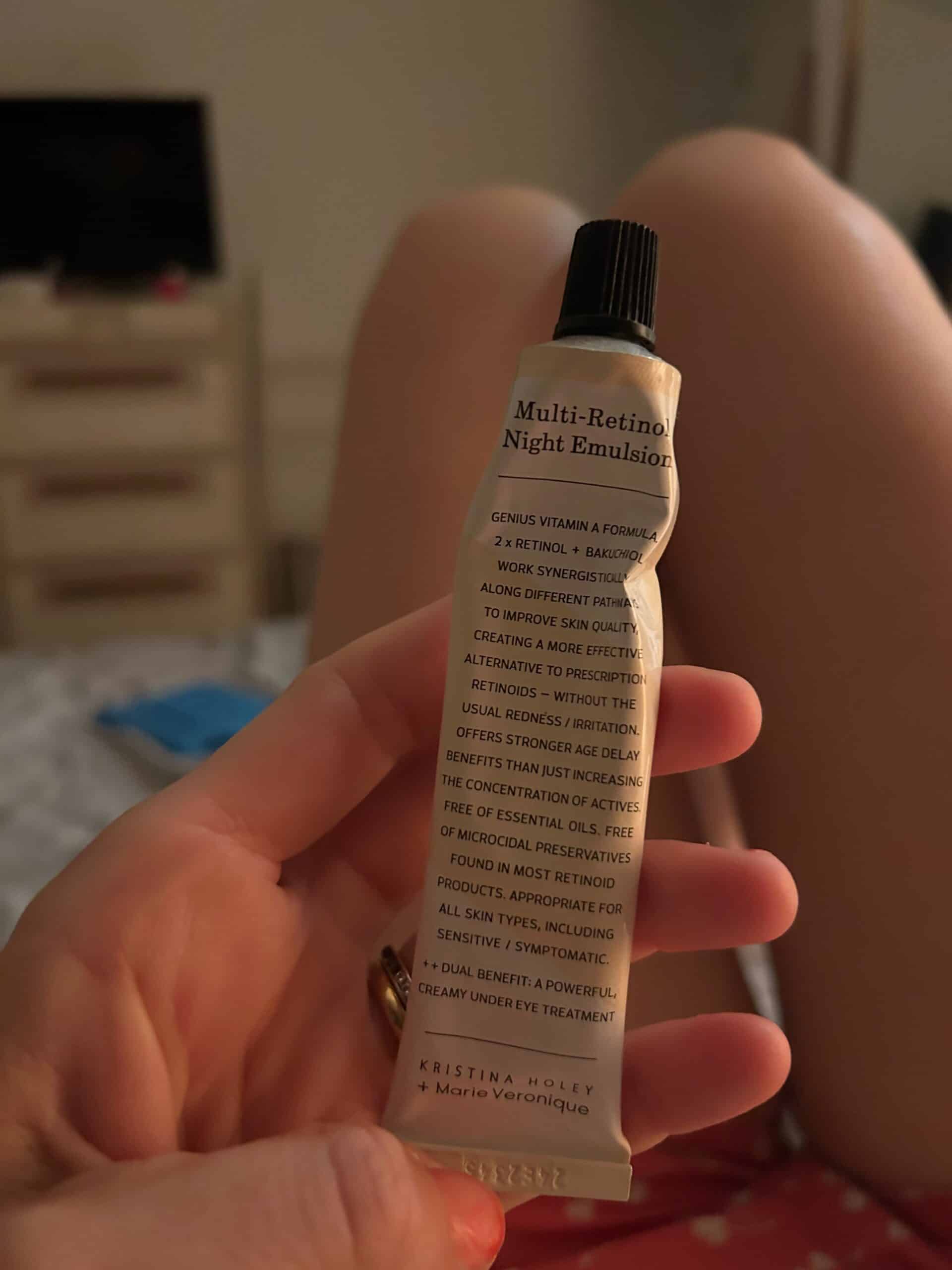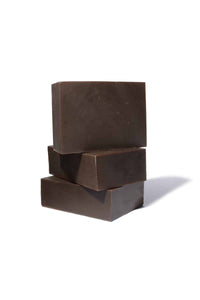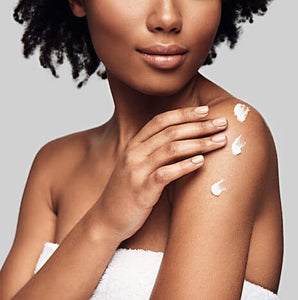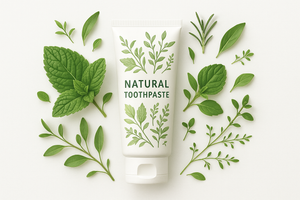Types of Retinoids
Retinoids encompass all forms of vitamin A, including both natural and synthetic derivatives. These compounds include retinol, retinaldehyde, and retinoic acid, which are naturally occurring, as well as synthetic retinoids like adapalene and tazarotene. Each form of retinoid differs in potency, effectiveness, and potential for irritation. Let’s go through them one by one.
Since we set out to identify the best natural retinol serums, we will begin with the natural retinoids.
1. Retinol
Retinol is the most common over-the-counter form of vitamin A. Once applied to the skin, retinol is converted into retinaldehyde and then into retinoic acid, which is the active form that impacts skin cells. Retinol is a gentle yet effective option for improving fine lines, wrinkles, and overall skin texture. Because retinol is less potent than retinoic acid, it’s often better suited for people with sensitive skin or those new to retinoid use.
2. Retinaldehyde
Retinaldehyde is one step closer to retinoic acid than retinol is. This means it’s more potent, stable, and effective, but still available without a prescription. We could only find one brand of retinaldehyde-based serum that we can call Good Stuff based on our other criteria for safety.
3. Retinoic Acid (Tretinoin)
Retinoic acid, also known as tretinoin, is the most potent form of vitamin A. It doesn’t need to be converted by the skin and works directly to speed up cell turnover and increase collagen production. This form is available by prescription only and is usually recommended for people with more significant skin concerns.
4. Synthetic Retinoids
In addition to the natural forms of retinoids covered above, there are several forms of synthetic retinoids, the most common of which are adapalene and tazarotene. Synthetic retinoids are are chemically modified to offer increased stability and potency, and are highly effective for treating skin issues like acne. We did not find any brands that use synthetic retinoids that we are able to recommend.
Most Retinoids Are Non-Toxic
You may have heard that retinol is a hormone disruptor and may be carcinogenic. Here’s what you need to know about this.
- Studies have shown that one form of retinoid, retinyl palmitate, can increase tumor formation on hairless mice exposed to UV light.
- As the weakest type of retinoid, retinyl palmitate is not one that we recommended because it’s not strong enough to make a significant difference in skin appearance. And the potential carcinogenic properties make this one definite Bad Stuff.
- These studies underscore the fact that topical retinoids can increase light sensitivity and lead to sun damage.
- The studies are specific to only retinyl palmitate. In contrast, there is a much larger body of research demonstrating the efficacy of retinoids in treating and preventing tumor formation and skin cancers.
- Though generally safe, retinoids can cause skin irritation, especially when first introduced. Overuse can lead to dryness and peeling, and prolonged sun exposure after use can result in sunburns. Retinoids may also be unsafe for pregnant or breastfeeding women and may even cause birth defects.
Bottom line: It’s best to avoid topical retinyl palmitate products. We also recommend avoiding vitamin A supplements containing these retinol ester derivatives. You should skip all retinoid products if you’re pregnant.
Problematic Ingredients in Retinol Creams
The problematic ingredients to avoid when choosing a retinoid product will be familiar to anyone who regularly reads our website. The best natural retinol serum brands will not contain:
- Phthalates or undisclosed synthetic fragrances.
- Certain preservatives, including parabens and other formaldehyde-releasers.
- Petrochemical-derivatives, such as PEGs, petrolatum, and mineral oil.
There are also a handful of ingredients that we typically don’t like–especially in products for kids–but which we think are acceptable in anti-aging products where performance is so important. These include:
- BHT
- Dimethicone
- Phenoxyethanol
- EDTA
Bottom line: There are some ingredients that we find unacceptable in retinoid products. A second group of not-so-great ingredients are what Dr. Hopkins considers “relatively benign and also ubiquitous” that you may find even in products we are recommending.
The Best Natural Retinol Serums Criteria
When searching for the best natural retinol serums, here’s what to keep in mind:
- Stability. When you spend (sometimes considerable!) money on a retinol serum, you want to make sure it’s going to actually work. I was surprised to learn that retinol, the most common retinoid in skincare products, is actually the least stable form. Retinoic acid and synthetic retinoids tend to be the most stable. We prioritized products that come in opaque containers to protect the retinoid from light degradation.
- Potency/Potential to Irritate. For natural retinoids, the more potent the compound, the more likely it is to irritate the skin. From least to most potent (and thus irritating), the general order is Retinol → Retinaldehyde → Synthetic Retinoids → Retinoic Acid. Keep in mind that retinoic acid is generally available only by prescription.
- Clean Formulation. We looked for serums that avoid potentially harmful additives mentioned above–like parabens, sulfates, and synthetic fragrances.
- Encapsulation. The best natural retinol serums use microencapsulation technology to improve the stability and effectiveness of the retinoid. This technology also helps reduce irritation. But the encapsulation shell can either be be made of a synthetic polymer/microplastic or a safe, naturally biodegradable organic material like chitosan, alginate, or gelatin. No brand that uses a polymer to encapsulate made our Best, Good, or Okay Stuff lists.
Retinol Alternatives
While retinol is a powerful anti-aging ingredient, some people prefer alternatives that are gentler on the skin. This guide is about identifying the best natural retinol serum brands, so we decided not to include retinol-alternative brands in our review. For the purposes of this report, we’re focused on evaluating products that incorporate some amount of true retinoid. However, there are a few notes on retinol alternatives for those of those interested in such a product:
- The most well-known, and probably the most effective, retinol alternative is bakuchiol. Derived from the Babchi plant, bakuchiol is a plant-based compound that has similar effects to retinol, promoting collagen production and protecting against oxidative stress.
- Unlike retinol, bakuchiol doesn’t increase skin sensitivity to sunlight and is less likely to cause irritation.
- While it might deliver similar results, bakuchiol is not not related to vitamin A in terms of chemical structure and doesn’t bind to the same receptors as retinol does.
- The biggest drawback to botanical alternatives versus retinol is that you may not see the same anti-aging effects and they typically aren’t quantified in a precise concentration the way that retinoid products are.
Here are some retinol-alternative products that meet our criteria for Good Stuff:
In terms of the brands that contain actual retinoids, or at least that claim to (!), here is how those stack up.


































